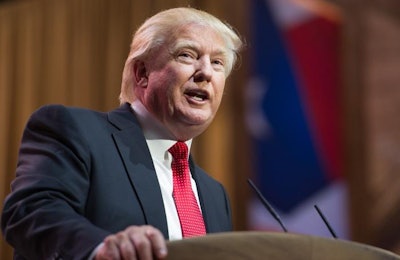
Today, global agribusiness intelligence firm Informa Economics’ webinar, “How Will US Election Results Influence the Economic Outlook?” explored the implications of President-elect Donald Trump's proposed policy initiatives.
Former Informa CEO and current Chairman of the Board Bruce Scherr steered away from predicting the actions of an administration that “hasn’t always been easy to read” and focused on Trump's five main campaign initiatives — tax cuts, spending, immigration reform, trade policies and deregulation — and their potential impact on the U.S. economy.
Historic tax cuts, spending
Trump’s initiatives represent an interesting shift from monetary policies toward a series of fiscal activities, i.e. tax cuts and increased spending, Scherr notes.
Trump’s current tax plan focuses on cuts to personal ($1.5 trillion) and business ($3 trillion) incomes, “the largest in history.” In addition to these huge tax cuts, Trump proposes increasing government spending on “infrastructure” to $1 trillion and another $1 trillion for the U.S. military.
“That’s 25 percent of our overall GDP – not insignificant. We can’t have 25 percent fiscal stimulus without it impacting the economy,” Scherr says. “What does it this mean to deficits? Well, it explodes deficits.”
The incoming administration presumes the load of such spending would be offset by economic growth, forecasting gains of 4 to 6 percent annually.
However, with the strength of the U.S. economy, which has been growing by 1.5 to 2 percent year over year, Scherr and many other economists don’t think the prospect of double or triple growth is realistic, citing that the actual number would hover closer to 2 or 3 percent. (Trump’s pick for Treasury Secretary, Steven Mnuchin, seems to agree, making a more conservative estimate in the 3 to 4 percent range.)
“The deficit will grow if we don’t hit at least 3 percent growth, which is unlikely,” Scherr states.
Immigration reform, bilateral trade not great for agribusiness
While tax cuts and spending will have a more immediate social and political impact on the economy, two of Trump’s initiatives could directly impact U.S. agriculture.
• Immigration: While Trump fueled his campaign on this promise of deportation and the erection of a border wall, Scherr doesn’t think it will happen because the undertaking will be “too hard, economically painful and growth limiting.”
“If they attempt to follow through, this will impact available labor in an economy with an already tight labor situation,” Scherr says, noting that, in the face of rising wages and labor limitations, the jobs that require “strong backs and physical labor” will go unfilled.
The impact on agriculture, primarily in produce, row crop and dairy sectors, would be staggering and would ultimately result in higher food costs and deplete the U.S. farmer’s ability to compete. For example, Texas A&M economists estimate milk prices would increase by 42.5 percent if even 50 percent of the milk industry's nearly 80,000 immigrant workforce was deported.
• Trade: Trump’s choice for Commerce Secretary, Wilbur Ross, will likely take a more isolationist stance on trade.
“Ross is a bilateral trade type,” Scherr notes. “If we continue to see a trend of more isolationists, populist leaders – bilateral trade agreements may be the approach over the next several years”
In Scherr’s opinion, the Trans-Pacific Partnership (TPP) is dead, noting that it is unlikely the Republicans who originally supported the multilateral trade agreement would stand in opposition to their party.
Love it or hate it, the death of the TPP ushers in a period of opportunity for competitors to capture commodity export opportunities in the Asia-Pacific region.
Trade agreements are "a tricky business that take a long time [to negotiate] and, in trade, when there are gaps to be filled, competitors step in,” Scherr warns.
He also mentioned that a strong U.S. dollar is viewed as destabilizing to emerging economies and would be the impetus for countries to take their export dollars and deals elsewhere.
Silver lining for feed manufacturers?
Deregulation and scaling back on big government were among Trump’s most popular talking points during the campaign.
U.S. feed producers likely look forward to the prospect of loosening or eliminating some of the more costly elements of the Food Safety Modernization Act (FSMA) and the Veterinary Feed Directive (VFD), among other federal regulations.
“Based on pre-election discussions with the Trump camp, our president-elect plans to embark on a regulatory revolution come January 20,” said AFIA President and CEO Joel G. Newman in a post-election statement. “AFIA asks he hold true to his campaign promise and make strict regulatory burdens a priority of this new administration.”
This may be good for business, but progress isn't free.
“As businesses foster deregulation and reduce costs – becoming more efficient — it could offset the inflation of the fiscal stimulus,” Scherr explains. However, he believes “a new era of more inflation and a transition from a normal curve to much higher interest rates” is upon us.
Economic growth is likely, Scherr says, but it will not come without consequences, i.e. inflation, rising interest rates, a strong dollar and new bilateral trade relationships.
“From an agriculture standpoint, it’s not the best news in the world; from a general economic standpoint, that’s pretty good news,” Scherr says.
The archived recording of Informa’s webinar is available here: https://pgi.webcasts.com/starthere.jsp?ei=1125378

















